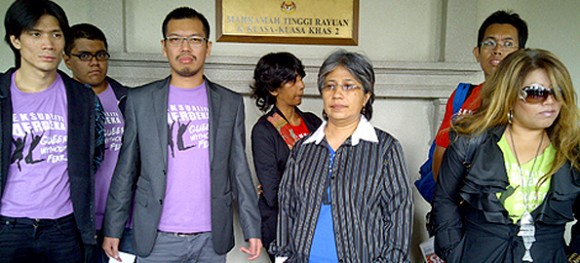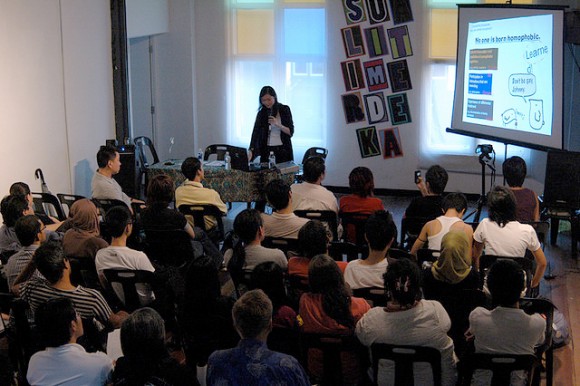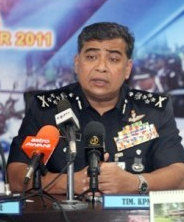ON 1 March 2012, the High Court dismissed Seksualiti Merdeka‘s leave application to judicially review a police ban on their annual festival. The November 2011 festival was banned under section 27A(1)(c) of the Police Act. The section (since superseded by the Peaceful Assembly Act) allowed the police to stop any activity on private premises “likely to be prejudicial to the interest of the security of Malaysia or any part thereof or to excite a disturbance of peace”.

High Court judge Rohana Yusof said the police were clearly empowered under this section to stop the festival. She said they were acting within their powers to investigate the matter and that the investigation process was not open to review.
But can a festival about sexuality rights be a threat to Malaysia’s security and public order? And in the light of the constitutional guarantee to freedom of assembly, shouldn’t a court require strong evidence from the police about how an event is likely to jeopardise national security?
Defining national security
The interest of the security of Malaysia or “national security” and public order are important terms in this country. Article 10(1)(b) of our Federal Constitution guarantees the right of citizens to assemble peacefully and without arms. But this freedom can be restricted on the basis of national security and public order. Restrictions on this basis can also be imposed on the constitutional guarantees to freedom of expression and association.
So what exactly do national security and public order mean?

Conventionally, threatening national security would constitute jeopardising the existence of the state. One example might be a plot to assassinate the country’s leaders. Or, simultaneous bomb attacks on the transport system, like in London on 7 July 2005. Or, planning to violently take over Parliament, kidnap the prime minister and hold him hostage, like in Fiji in 2000. These are all good examples of real threats to national security.
What about disturbance of peace, or threat to public order? In modern times, this usually refers to threats to life and property. The UK Public Order Act, for example, prohibits unlawful violence, rioting and threatening behaviour that would cause people of reasonable firmness to fear for their personal safety.
So, under the Malaysian constitution, citizens are free to meet as long as they are peaceful and don’t bear arms. But if they engage in activities such as plotting to blow up Parliament or threatening to cause physical harm to others, then they can be restricted from engaging in such activities. And the authorities, like the police, can enforce laws that prohibit and restrict such gatherings.
Security and sexuality
Which brings us to the question — just how does Seksualiti Merdeka constitute a threat to national security and public order?
As far as I know, the festival organisers were not planning a violent coup d’etat nor were they hatching a devious plot that could threaten the state’s existence. I also did not hear of festival attendees rioting or damaging property or threatening anyone’s personal safety.

Sure, there are many in our community who disagree with openly discussing one’s sexual orientation. Seksualiti Merdeka is a festival on sexuality and the right of everyone to be free from discrimination, harassment and violence due to their sexual orientation. This includes talking about being lesbian, gay, bisexual or transgender. Some religious groups believe that being in a same sex relationship is a sin. Others may feel that culturally, we shouldn’t be talking about such topics in public. Some others may not have liked it that Bersih 2.0 chairperson Datuk Ambiga Sreenevasan was scheduled to officiate the event.
But none of these are lawful reasons to ban the event. Our constitution did not say that if lots of people disagree with what a group is doing, then that group’s activities can be banned. It says that if the group’s activities are a threat to national security and public order, then, and only then, can it be restricted. And our constitution is the supreme law of the land.
What our constitution does allow for those who disagree with Seksualiti Merdeka is to speak up about it. They can dialogue with the organisers on why they disagree. They can organise campaigns about morality, if they so wish, and on not speaking about sexuality openly. They can protest, if they must, against the event, but peacefully and without resorting to any threatening or abusive behaviour and language.

In banning the event, Deputy Inspector-General of Police Datuk Seri Khalid Abu Bakar said: “Let us not look into the interest of minority groups and end up infuriating the majority.”
Forgive me, but that’s just tyranny. The constitutional guarantee on freedom of assembly is there precisely to protect the minority against the majority. So that even if a whole lot of people disagree with what you’re doing, you are still protected as long as you do it peacefully and without threat to others’ life and safety.
Who is the court protecting?
So should the court have decided differently? Well, there are always legal arguments to justify a decision and in this case, the judge held that reviewing a criminal investigation was not within the court’s purview. She also upheld the Attorney-General Chamber’s objection that as the event was in the past, the application was academic and need not be heard.
Despite these legal justifications, in my view, I am uncomfortable with how easily it was accepted that it was “clearly” within the police’s power to ban the event on the grounds that they did. The police said 28 police reports and complaints from religious groups were lodged against Seksualiti Merdeka. But I still don’t see how that makes Seksualiti Merdeka a likely threat to national security and public order. If anything, it’s some of the groups that had threatened Seksualiti Merdeka which were themselves threats to public order, not the other way around.

In restricting fundamental freedoms in the name of national security, courts must perform a balancing act — to impinge as little as possible upon the guaranteed freedom while achieving the aim of protecting the state. In this case, it is firstly unclear why the state needed to be protected from Seksualiti Merdeka. And secondly, from what can be gathered from news reports, it does not appear that the constitutional guarantee of freedom of assembly was even weighed in the balance.
Protecting us all
This has serious implications for all of us. The courts are meant to protect us from the arbitrary use of power by the authorities. Surely it cannot be left entirely to the police to decide when something is a threat to national security and public order. What if they get it wrong? As is often cited, “Quis custodiet ipsos custodes?” Or, who will guard the guards? If the courts won’t intervene to call the police to account for their actions and decisions, then who will? ![]()
Ding Jo-Ann believes it’s up to Malaysians to speak up in support of our fundamental rights. She supports Seksualiti Merdeka’s right to assemble peacefully.


JW Tan says
Well said. If you ban people from speaking out because they disagree with you, then when things come full circle, you may find that you are banned from speaking out in turn.
People who advocate a ban on The Star for publishing those Erykah Badu pictures should also take note. Rudeness is not a good reason to ban people from speaking out.